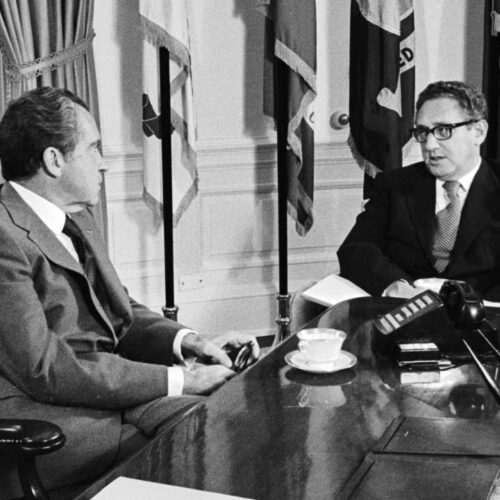The Politics of the Heart on Stage

Editor’s Note: The group quota regime is a totalitarian threat to our way of life precisely because it controls (or seeks to control) everything, from our government and commerce to our media and schools. Nowhere has this conquest been more complete than in our culture, as every piece of popular art now seems reduced to woke propaganda.
In a recent essay for The American Mind, Spencer Klavan argued that it is conservatives’ own responsibility to remedy this situation, both by making traditional art that rises above the level of political kitsch, and (most importantly) by forming citizens who are able to discern good art from bad—on both aesthetic and moral grounds.
Tom Klingenstein’s newest play, Our American Queen, just completed its initial run at the Flea Theater in New York City. The play follows Kate Chase, daughter of the ambitious Treasury Secretary Salmon P. Chase, as she navigates the personal and political minefields of a nation at war with itself. In this review, published at The New Criterion under the title “Salmon run,” Wall Street Journal critic Kyle Smith praises Our American Queen as an “exquisitely nuanced piece” which “appears to be a play about political scheming [but] tilts heavily toward matters of the heart.”
“The chief glory of a woman is not to be talked about,” notes Treasury Secretary Salmon P. Chase in Our American Queen, the new play by Thomas Klingenstein (at the Flea Theatre through June 29). Chase is directing his comment, or warning, at his daughter Kate, who proved him wrong. She was much talked about in her day, the Civil War era, but only with admiration. This exquisitely nuanced piece reopens the door to a lesser-known historical figure who, in Klingenstein’s able portrait, embodies the nexus of romance and power politics.
Klingenstein’s director Christopher McElroen has found a duly captivating star to personify Kate: Brooke Camilleri Agius is radiant, calculating, troubled, vulnerable, steely, and touching in a play that is engineered to make the most of its central figure, and does. Klingenstein, whose previous plays include Douglass (2016) and If Only (2017), explores how Chase (played somewhat stiffly by Paul Niebanck) was urged by Kate to follow through with his plan to usurp his boss, who happens to be Abraham Lincoln. Chase, an abolitionist and former Ohio governor and senator, failed to win the nomination for the Republican Party (of which he was one of the founders) in 1860 but, in the lead-up to the next election, is thinking about running again. In 1862, the war isn’t going particularly well, and Kate thinks her father’s the man for the job of winning it. Funding, however, is likely to be an issue. (Though what is today one of the world’s largest banks was named in his honor, Chase had no equity in the venture and wasn’t a plutocrat.) Moreover, Chase needs the support of an old antagonist, Ohio’s Senator Benjamin Wade. Kate, one of Washington’s most charming hostesses, intends to win him over at a dinner party at which the presidential campaign will be informally launched, and the entire play takes place on and around a large, rectangular dining table that seats twelve. Tightly constrained by the space, with the audience seated just a few feet away on either of the long sides of the table, McElroen uses offstage music and two framed images facing the table across from its short sides to subtly alter the mood. The setting (and upsetting) of the table will also reflect Kate’s internal order, or its loss.
Chase is a brusque old fellow who can’t believe he lost to a “country lawyer” but also lacks the fire in the belly to attempt to dethrone Lincoln, whom his daughter calls “a weak and fumbling executive who must be replaced.” Much of the fumbling, however, can be ascribed to an old friend of hers: the Union’s commanding general, George McClellan (Dana Watkins), who though married still has daydreams about a kiss he and Kate once shared. McClellan, too, has designs to run against Lincoln, and the play is a useful reminder that history’s most popular president was anything but universally beloved during his tenure.
A more compelling romantic option for Kate is John Hay (Christopher Wareham), who would later be secretary of state but at this point is merely a poet in his mid-twenties serving as personal secretary to the president. He often appears at the Chases’ with messages for the treasury secretary but lingers to discuss politics and books with Kate. Their discussions of Walt Whitman and Great Expectations are Klingenstein’s emotionally rich and tantalizingly indirect way of establishing their mutual affection, and, thanks in part to Wareham’s charm, their conversations are the most endearing ones in the play. Yet as her father continues to mull a presidential run, Kate steams ahead with preparations to marry a rich man: Senator William Sprague (unseen in the play), who could easily finance the campaign and gives her a bejeweled tiara as an engagement present. Observing this, Hay says bitterly that he won’t be attending their wedding, but perhaps he’ll be there for “the next one.” Her father, three times a widower, also has an admirer: Carlotte Eastman (Roya Shanks). Even if Chase decides not to run for president, she might be a complicating factor in the proposed marriage of Kate to the senator.
So what appears to be a play about political scheming tilts heavily toward matters of the heart, and Klingenstein does a skillful job segueing between the two. A directorial flourish involves changing the portraits hanging on the walls to a live video feed that shows another side of Kate, captured in layered images suggesting deep disturbance, who carries resentments against her father that she can’t quite keep at bay. In the later scenes of the play, with Carlotte acting against her own interests and emerging as a surprisingly wise confidante to Kate, the fragility of the bond between Hay and Kate becomes almost unbearable. She is very much a woman of her time, and yet Klingenstein doesn’t refract her dilemma through today’s fashionable cliché that women of the past were simply hapless victims of male dominance. Kate is nobody’s stooge; she makes her own decisions. But she can’t help putting the interests of others first, and Camilleri Agius does a wonderfully textured job of capturing the character, with her beauty and charm balanced by carefully managed sorrow. Klingenstein’s engrossing and deft play ensures that she will continue to be talked about.
Kyle Smith is the film critic for the Wall Street Journal.

